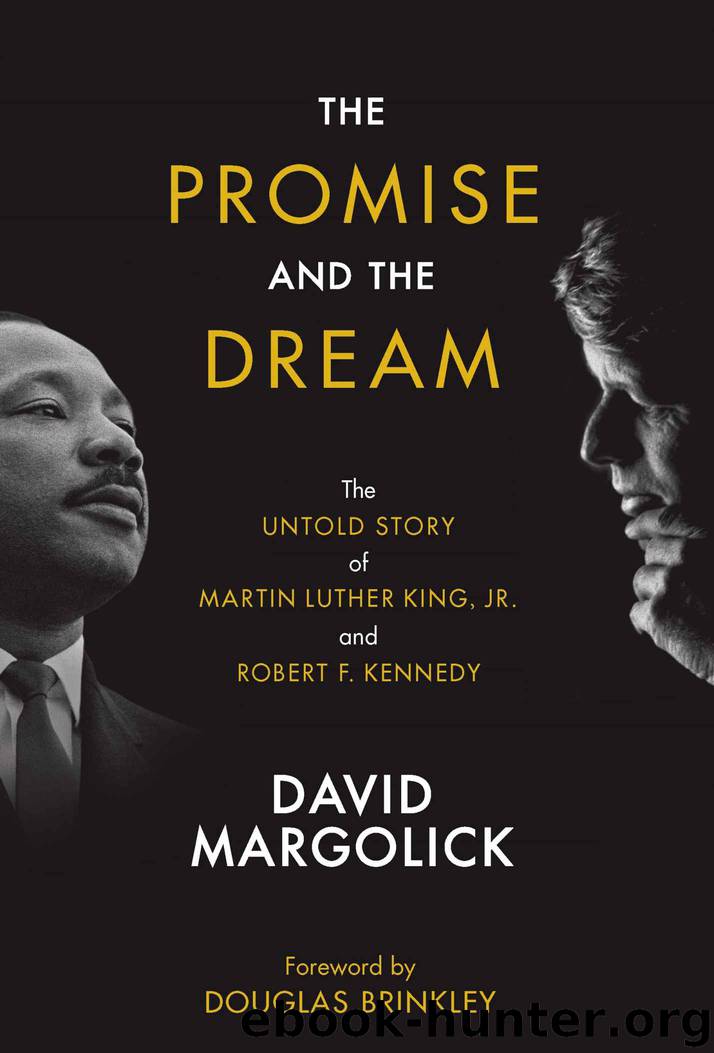The Promise and the Dream: The Untold Story of Martin Luther King, Jr. And Robert F. Kennedy by David Margolick

Author:David Margolick [Margolick, David]
Language: eng
Format: azw3, epub
Publisher: RosettaBooks
Published: 2018-04-02T16:00:00+00:00
As catastrophic as his brother’s death was for Kennedy, it liberated him still more. Because he’d experienced life at its most random and cruel and irrational, because he feared he had already peaked, because his heart wasn’t really in anything, because he carried the banner of someone even more popular in death than he’d been in life, and because he looked and sounded so much like him, Kennedy had a long leash; any criticism he might encounter was child’s play after what he’d already endured. He was free to be whatever he wanted, whenever he figured out that. Arthur Krock of the New York Times had seen it all before: just as Jack was riddled with doubts until Joe, Jr., had died, only with Jack’s death could Bobby come into his own. That his father was out of commission from a stroke also helped.
Even though he had already planned to leave the Justice Department, Jack’s death, oddly enough, was prolonging Robert Kennedy’s tenure: he pledged to Johnson that he’d stay through the election in November. But what came next? He could go back to Massachusetts and teach. Or head the Department of State or Defense if asked. He could become an ambassador somewhere like the Soviet Union or even Vietnam. (He offered as much to Johnson, but tempting as that might have been for LBJ to deposit him in Saigon — in one deft move he could simultaneously remove Kennedy from the scene, shut him up, and tie him to his policies — the new president demurred: Kennedy might be killed there, and then Johnson would have that on his conscience.)
Kennedy, the short-lived journalist, thought of buying a newspaper somewhere — maybe the perpetually struggling New York Post — or running a foundation. His first thought had never been elected office because, well, it had never been: he hadn’t imagined himself in that role. “As long as it’s on me and not on my brother, that’s the way I want it,” he liked to say during the White House years. “I’m not going to ever run for anything.” But others fantasized: Walter Lippmann recommended a bid against Governor Nelson Rockefeller of New York, apparently not aware that, having failed to live in New York for five years nor voting there, he couldn’t, constitutionally. Kennedy adviser Richard Goodwin suggested Adlai Stevenson leave his post at the United Nations to run for the Senate and Kennedy take his place. That was the option that Schlesinger, yearning for a Kennedy restoration and always exploring the angles, favored. “It would keep Bobby in the administration but away from Washington; it would enable him quietly to establish a political base in New York; and it would help kill the public impression of him as the ruthless prosecutor,” he wrote.
In late spring 1964, as the Civil Rights Act slowly surmounted southern opposition — Levison’s brother urged Levison to stop King from going on a hunger strike to press for its enactment, warning that King “most likely will starve to death” if he did — both Kennedy and King went out into the field.
Download
The Promise and the Dream: The Untold Story of Martin Luther King, Jr. And Robert F. Kennedy by David Margolick.epub
This site does not store any files on its server. We only index and link to content provided by other sites. Please contact the content providers to delete copyright contents if any and email us, we'll remove relevant links or contents immediately.
| Africa | Asia |
| Canadian | Europe |
| Holocaust | Latin America |
| Middle East | United States |
Fanny Burney by Claire Harman(26603)
Empire of the Sikhs by Patwant Singh(23086)
Out of India by Michael Foss(16853)
Leonardo da Vinci by Walter Isaacson(13336)
Small Great Things by Jodi Picoult(7143)
The Six Wives Of Henry VIII (WOMEN IN HISTORY) by Fraser Antonia(5515)
The Wind in My Hair by Masih Alinejad(5095)
A Higher Loyalty: Truth, Lies, and Leadership by James Comey(4964)
The Crown by Robert Lacey(4817)
The Lonely City by Olivia Laing(4802)
Millionaire: The Philanderer, Gambler, and Duelist Who Invented Modern Finance by Janet Gleeson(4478)
The Iron Duke by The Iron Duke(4356)
Papillon (English) by Henri Charrière(4274)
Sticky Fingers by Joe Hagan(4199)
Joan of Arc by Mary Gordon(4112)
Alive: The Story of the Andes Survivors by Piers Paul Read(4033)
Stalin by Stephen Kotkin(3966)
Aleister Crowley: The Biography by Tobias Churton(3640)
Ants Among Elephants by Sujatha Gidla(3467)
